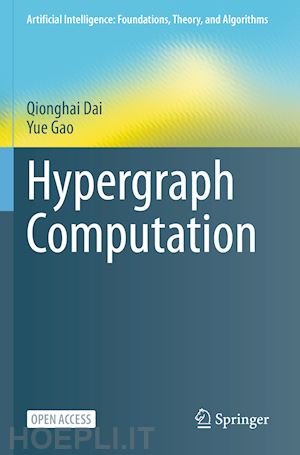
Questo prodotto usufruisce delle SPEDIZIONI GRATIS
selezionando l'opzione Corriere Veloce in fase di ordine.
Pagabile anche con Carta della cultura giovani e del merito, 18App Bonus Cultura e Carta del Docente
This open access book discusses the theory and methods of hypergraph computation.
Many underlying relationships among data can be represented using graphs, for example in the areas including computer vision, molecular chemistry, molecular biology, etc. In the last decade, methods like graph-based learning and neural network methods have been developed to process such data, they are particularly suitable for handling relational learning tasks. In many real-world problems, however, relationships among the objects of our interest are more complexthan pair-wise. Naively squeezing the complex relationships into pairwise ones will inevitably lead to loss of information which can be expected valuable for learning tasks.
Hypergraph, as a generation of graph, has shown superior performance on modelling complex correlations compared with graph. Recent years have witnessed a great popularity of researches on hypergraph-related AI methods, which have been used in computer vision, social media analysis, etc. We summarize these attempts as a new computing paradigm, called hypergraph computation, which is to formulate thehigh-order correlations underneath the data using hypergraph, and then conduct semantic computing on the hypergraph for different applications. The content of this book consists of hypergraph computation paradigms, hypergraph modelling, hypergraph structure evolution, hypergraph neural networks, and applications of hypergraph computation in different fields. We further summarize recent achievements and future directions on hypergraph computation in this book.
Yue Gao is an Associate Professor of School of Software at Tsinghua University. His main research interests focus on Artificial Intelligence, Computer Vision and Brain Science. He has published over 200 papers in the areas of Artificial Intelligence, 3D Vision, Multimedia, and Medical Image Analysis. Prof. Gao has authored the books " View-based 3-D Object Retrieval" (2014) and " Learning-Based Local Visual Representation and Indexing" (2015). He has been an associate editor for prestigious journals such as IEEE Transactions on Signal and Information Processing over Networks, Journal of Visual Communication and Image Representation, and IEEE Signal Processing Letters. He is a Senior Member of IEEE. He was listed as the Web of Science Highly Cited Researcher and Elsevier Highly Cited Chinese Researchers.
Qionghai Dai is a Professor and the Dean of School of Information at Tsinghua University. He is the member of Chinese Academy of Engineering. His main research interests focus on Artificial Intelligence, Computational Imaging and Brain Science. He has published over 400 papers at Cell, Nature Photonics, Nature Biotechnology, IEEE TPAMI, etc. Prof. Dai has authored the books " View-based 3-D Object Retrieval" (2014), " Learning-Based Local Visual Representation and Indexing" (2015), “3D Video Processing and Communication” (in Chinese, 2016), “Multidimensional Signal Processing: Fast Transform, Sparse Representation and Low-Rank Analysis” (in Chinese, 2016), and “Computational photography: Computational Capture of Plenoptic Visual Information” (in Chinese, 2016). He has been an associate editor for prestigious journals such as IEEE Transactions on Image Processing and IEEE Transactions on Neural Networks and Learning Systems. He is the President of Chinese Association for Artificial Intelligence, a Fellow of CAAI and CAA, and recipient of numerous awards, including the National Natural Science Award of China (three times). He was listed as the Web of Science Highly Cited Researcher.











Il sito utilizza cookie ed altri strumenti di tracciamento che raccolgono informazioni dal dispositivo dell’utente. Oltre ai cookie tecnici ed analitici aggregati, strettamente necessari per il funzionamento di questo sito web, previo consenso dell’utente possono essere installati cookie di profilazione e marketing e cookie dei social media. Cliccando su “Accetto tutti i cookie” saranno attivate tutte le categorie di cookie. Per accettare solo deterninate categorie di cookie, cliccare invece su “Impostazioni cookie”. Chiudendo il banner o continuando a navigare saranno installati solo cookie tecnici. Per maggiori dettagli, consultare la Cookie Policy.